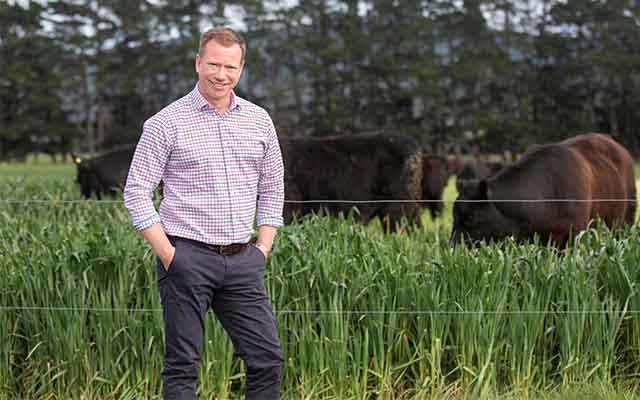FarmIQ chief executive Will Noble says technology will inform, not replace, traditional approaches to farming.
It’s only been a matter of months since FarmIQ bought Farmax from AgResearch last October, but the two companies say they have been putting foundations in place to ensure farmers will benefit from their ongoing collaboration.
Farmax chief executive Gavin McEwen says there has been an integration between the two companies for years, particularly on the red meat versions of the two products, with FarmIQ’s focus on recording farm data complementary to Farmax, which has developed into a tool for future predictive modelling.
He said farmers will benefit from that ongoing collaboration, with the first of those benefits a rationalisation of what is a very small domestic industry.
“Developing agritech tools is expensive,” McEwen said, adding that there’s only a pool of about 20,000 professional farmers.
“I would daresay there’s been tens of millions of dollars spent over the last decade that potentially didn’t need to be spent if there was better collaboration in the industry.
“FarmIQ and Farmax coming together is a rationalisation that needed to happen so that we can deliver products to farmers that are cost efficient and beneficial, without wasting capital.”
He said one area that has long been discussed in the sector is duplication of data.
“We’re looking to address that, not only between Farmax and FarmIQ, but also between other collaborators of agritech tools, for example our friends at Figured, our friends at Farm Focus,” he said.
McEwen said the modern way of removing data duplication is through APIs (application programming interfaces), which FarmIQ has been heavily involved in.
“That’s the infrastructure that we hope will make life simpler and more pleasant for farmers to enter data,” he said.
FarmIQ chief executive Will Noble says one of the first things he focused on when he took up his job in October 2020 was getting an API strategy in place, so it could start to facilitate the data sharing that it is capable of.
“Making it easier for farmers to share their data on a permission basis, where they want it to be shared,” Noble said.
He said historically that integration was there, but direct integration is harder to manage.
“The new way of doing it is APIs, which makes those connections much more robust and usable,” he said.
“Now, rather than building a direct API, to say Silver Fern Farms, we built a kill sheet API so any processor can integrate with that.
“In the same way, the next cab off the rank is a financial systems API, which Farm Focus or Figured or any farm finance system can connect to.
“It’s not about connecting specifically to another party, it’s the utility of the thing.”
One of the stumbling blocks in the past, and one that is only slowly being overcome, is a reluctance to share data.
McEwen and Noble are both very clear about who owns the data Farmax and FarmIQ work with.
“We’re completely on the same page,” McEwen said.
“It’s farmers’ data.”
Noble said FarmIQ has a farm data manifesto, a six-point list of its attitude towards data, which starts with farmers owning the data.
“That needs to be the central tenet,” Noble said.
“A lot of people talk up the technical nature of sharing data but the tech side of things isn’t the challenge, it’s the relationships between the organisations that need to be willing to share the data.
“Unfortunately, there are still some players in the market who consider the data that they collect from their suppliers, for example, to be their data because they collected it and (they) are not willing for farmers to be able to share that data around because they believe that somehow that’s going to erode their competitive advantage.”
McEwen said while everyone in the farming sector is grateful for the high prices their products are currently attracting, there are a lot of challenges facing farm businesses, which means they may have to tweak their farming operations.
“It’s easy to generalise but the business world of farming is a hell of a lot more complex than it has ever been (in the past),” McEwen said.
“We have market demands, we have greenhouse gases, animal welfare concerns, all on top of the complex business of running a biological operation in the first place.
“Farmers cannot keep all that stuff in their heads anymore or keep all the relevant information in notebooks that run the risk of going through the washing machine.”
Noble said while technology has a key role to play, it should complement, not replace farmers’ traditional approach.
“A lot of NZ farmers still like to farm on instinct, they’re intergenerational, they learned to farm from their families, there’s a real sense of farmerhood about being successful at what they do,” he said.
However, he said an increasing number of farmers are seeing technology is not a challenge to that farmerhood, instead it supports them to be better farmers.
“It doesn’t undermine that you still need to be a good instinctive farmer who understands their animals and their land but having data can support those decisions,” he said.
“Data is becoming more and more important, but it should be augmented with farmers’ existing skills and instinct, it’s never going to be a replacement.”










